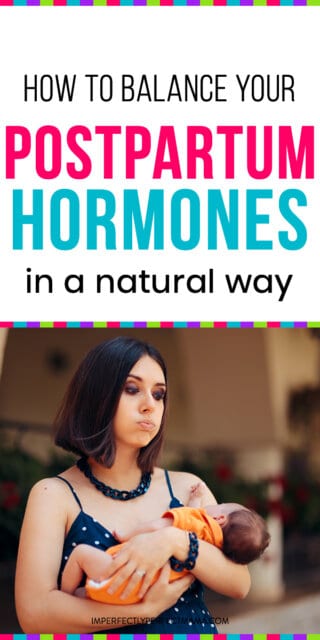You are finally home with your bundle of joy! Hurrah! You did it, mama!

And now you just want to settle down and start enjoying your adorable new baby. It is an exciting time.
But, maybe things just don’t feel quite as you had expected.
You know, though, in the last nine months, your body has done a lot to ensure a healthy pregnancy and birth – that has left a mark or more.
It is a miracle really what your body has done. Just think about it. Your uterus grew from the size of a grapefruit in the first trimester to that of a watermelon holding up to 800 mls of fluid in the third trimester.
And you know what made all this possible? It was hormones.
The whole beautiful ordeal you have been through to make and deliver your beautiful baby was made possible by hormones. They orchestrated the pregnancy from conception to birth.
But you are glad that part is all over with now though. And while you are enjoying the baby, there is a lot to do and you are exhausted and emotional (perhaps even more than emotional).
You may be feeling a little bit teary, irritable, moody and even maybe a bit blue. Perhaps maybe even right out depressed.
With all the pains from your battered body, lack of sleep and the demands of the new role you have, your emotions and mental health are highly taxed.
As an exhausted mom, it’s hard to tell what’s causing what with all these churnings of emotions.
Your body has gone through major hormonal upheaval from the moment of conception to birth and hormones are still raging.
Hormones are likely still influencing a lot that is going on in your body and mind – affecting how you feel now.
You are more than likely experiencing postpartum hormonal imbalance.
And you are not alone.
Postpartum Hormonal Imbalances Are More Common Than You May Think
A lot of mothers experience postpartum hormonal imbalance which can lead to mood disturbances ranging from baby blues to full-on depression.
Turns out a whopping 80 % of postpartum moms experience baby blues characterized by mood swings a few days after delivery. For the most part normally just chuck it all to new mom exhaustion, the pain from the cuts and stitches, and round the clock baby care.
Baby blues are very common in the early days after giving birth and “symptoms can range from sadness, mood swings, irritability, sleep changes, anhedonia, and excessive worry to lack of interest in the baby“.
These symptoms can resolve in a few days, maybe a week or two but if they drag on for weeks then it is likely more serious than baby blues and maybe postpartum depression.
In this case, the help of mental health professionals is vital as well as an evaluation by your own doctor.
What Are Hormones?
Hormones are chemical messengers that influence many biosynthetic reactions in the body including mood, metabolism, appetite, energy weight, fertility, pregnancy, birth, libido, sleep and many much more.
Additionally, hormones and the nervous system work together to control mood and emotions. And they work in a controlled feedback loop and are supposed to maintain a balance to function properly.
The balance, however, can be affected by many events and especially giving birth. So let’s take a look at the events that lead to postpartum hormonal imbalance.
What Causes Hormonal Imbalances After Pregnancy?

Estrogen and Progesterone
The imbalance between estrogen and progesterone is the main cause of postpartum hormonal imbalance.
During pregnancy, progesterone is at all times high with the placenta producing it at many times more than women normally produce at any other time so as to maintain a healthy pregnancy. And why is this?
Progesterone does things like relaxing the muscles of the uterus to prevent premature contractions, and with another hormone relaxin, also relaxes the ligaments to accommodate the growing baby. And later relaxes the cervix for birth.
But after birth and removal of the placenta, progesterone level drops suddenly. And it is a big drop. They plummet.
This is one of the largest drops in any hormone within a short time. And within a few days, a woman is plunged into an extreme case of PMS. Yes, its a glimpse of your menopause.
After birth, you literally have no source of progesterone. Your other source of progesterone is the corpus luteum but this is only available with ovulation, but that is not happening now.
So Estrogen is running this show and she is not playing nice! This imbalance is causing many of the unpleasant feelings and even health issues occurring after delivery.
The hormonal imbalance is also complicated and extended by breastfeeding which may delay ovulation, sometimes up to a year.
Moreover, breastfeeding can make periods irregular as well, making that source of progesterone unreliable.
Then comes prolactin to support breastfeeding and milk production. Unfortunately, prolactin affects dopamine. When prolactin is high, dopamine drops, and vice versa. A drop in dopamine plummets a new mom into even more emotional lows-depression, decreased libido, even brain fog.
Prolactin also plays a part in metabolism, and immune health, and regulates fluid balance too, which adds on to issues with water retention, and infections. And it is no wonder a new mom may feel off-kilter.
While the balance between progesterone and estrogen is the main cause of postpartum hormonal imbalance, there are other contributing factors.
Stress During the Postpartum Stage
Another cause of hormonal imbalance after pregnancy is stress and anxiety related to maintaining the well-being of the new baby.
Inexperience adds to the anxiety and if you are a mom with other little kids, plus other household responsibilities, stress can skyrocket as you struggle to maintain all the roles of motherhood and a household.
Stress escalates if you have to go back to work and trying to juggle it all. And, all this stress can interfere with ovulation further delaying progesterone production and increasing hormonal imbalance.
Lifestyle and Postpartum Hormonal Imbalances
The things you do daily including food choices, your sleeping habits, routines, self-care products you use and more can all contribute to hormonal imbalance.
Ultimately, hormonal imbalance after birth can lead to estrogen dominance and its negative effects on physical and mental health.
How To Tell if You Have Estrogen Dominance
If you are feeling just a bit, or a lot, off and wondering when you will ever feel better again after delivery, you may be experiencing estrogen dominance.
The best thing is to pay attention to your body and see your doctor for a through physical and lab work.
Start a journal and write how you feel and what is happening every day so you are more self aware. Document the moods, any changes in physical health so you have something to go by and can share with a the doctor or mental health professional and also this will help you know when you start to see change and improvement.
Signs of Estrogen Dominance After Pregnancy
When estrogen and progesterone, are not in balance, mild to severe postpartum distress syndrome can occur.
A severe case is postpartum depression and according to the Centers for Disease Control, at least 12-20 percent of new moms develop postpartum depression.
The signs and symptoms of postpartum hormonal imbalance are many and include the following:
- Fatigue
- Anxiety, and panic attacks
- Depression
- Irritability
- Weight gain
- Bloating and water retention
- Insomnia
- Mood swings/anxiety/ depression
- Hair loss
- Irregular periods
- Severe menstrual cramps
- Fluid retention
- Dry thin hair
- Low sex drive
- Headaches
- Infections
Granted you won’t have all of them. The symptoms also decrease with time. Some, however, may linger for a few months even years after having the baby.
Some people may continue to have insomnia for example, long after the initial postpartum period.
But if depression and run down moods persist, it is important to talk to your doctor.
The Effect of Estrogen Imbalance on Other Hormones

Thyroid Hormone Imbalance
Estrogen dominance sometimes leads to an imbalance of other hormones as well. It can prevent the conversion of T4 into T3, and too much estrogen can also reduce the uptake of the thyroid hormone.
Sometimes elevated estrogen levels lead to inflammation of the thyroid gland and postpartum thyroiditis.
The inflamed thyroid causes increased the production of thyroid-binding globulin by the liver which binds the thyroid hormone reducing free thyroid hormone available in the blood.
All these actions make a postpartum mom appear hypothyroid.
Symptoms may subside in 12-18 weeks but some women stay hypothyroid for good.
And that may be why more women suffer hypothyroidism compared to men. Many health professionals are aware that women suffer hypothyroidism almost 5 times more than men. Now we see why.
It is important that your doctor checks to see if estrogen dominance is the cause of thyroid issues before they opt for thyroid medications, advises Marina Gutner, Ph.D. in How Estrogen Dominance can Ruin Your Thyroid Health. Usually, these symptoms subside with estrogen balance.
Signs and symptoms of hypothyroidism.
- Cold intolerance
- Brittle dry nails and hair
- Dry skin and weight gain
- Edema
- Constipation
- Depression
- Shortness of breath (which can also be caused by anemia)
- Myxedema
Sometimes though, the opposite can happen and hyperthyroidism can happen to lead to weight loss, irritability, anxiety, sleeplessness, and fatigue.
Adrenal Fatigue
Estrogen dominance can also cause adrenal fatigue. The stress hormone cortisol is supposed to surge when we have a stressful situation- you know like we need to run from a marauding tribe, wild animal and the like. Then it is supposed to ease out.
But in excessive daily stress, the body pumps out too much cortisol and needs so much that it steals from pregnenolone, the common building block of adrenal hormones and progesterone.
As a result, the production of progesterone is inhibited as well as that of other hormones that use the same biosynthesis path way. And for a postpartum mom, this compounds estrogen dominance.
Adrenal fatigue can also happen when the adrenals cannot meet the high demand for cortisol caused by the escalated stress due to demands on the postpartum moms trying to manage the new baby care and schedule leading to a lack of sleep and stress.
For some moms, adrenal fatigue plagues them long term due to high-stress levels of doing it all-including maintaining a career and familial relationships on top of being a mommy.
The symptoms of adrenal fatigue include the following and some are the same as symptoms of estrogen dominance.
- Irritability
- Moodiness
- Weight gain
- Fatigue and sleep disturbances
- Dizziness/lightheadedness
- Headaches
- Mood swings
- Irregular periods
- Immunity problems
One unfortunate thing is that decreased cortisol can affect mother-baby bonding according to an article in The Canary Club. It is therefore important to prevent or decrease stress to avoid adrenal fatigue.
How Long Does it Take to Balance Hormones After Pregnancy
It may feel like forever when you are experiencing the roller coaster of hormonal imbalances, but usually, this gets better in about 6-8 weeks.
However, if breastfeeding hormonal imbalance can last much longer. Ovulation may not happen for the whole year and you may not have a period during this time. That means no ovulation, no progesterone. So the imbalance lingers on.
So you are pretty much doomed for a long long time? Not quite! You can help yourself out. There are a few things you can do to balance your postpartum hormones naturally.
How to Balance Postpartum Hormones Naturally

As you can see the effects of estrogen dominance are many and quite terrible.
You may be wondering when you will start feeling like your old self again. There is hope.
There are a few things you can do to balance your postpartum hormones.
Talk to Your Doctor
You may need to be proactive and ask the doctor to check for hormonal imbalance including a thyroid hormone panel.
You need a practitioner who doesn’t rush to prescribe meds but digs deeper into the root cause of the depressive symptoms for example.
Before you take that depression prescription make sure all causes for your mood have been evaluated. While you may still need to take the antidepressants it may not be forever.
Diet and Nutrition
Your diet is crucial to balancing your postpartum hormones. It is important to know what to eat and what to avoid.
Avoid inflammatory foods such as those that contain GMO’s. These foods are altered and may contribute to estrogen dominance.
Also stay away from artificial sweeteners such as Stevia. Stevia contains glycosides that act like hormones and phytoestrogen. Remember that high levels of estrogen means progesterone is inhibiting and delaying ovulation. Artificial sweeteners can also affect gut health and result in guy dysbiosis and issues with your immune system.
Wheats that have been doused with estrogen to aid in growth as well as pesticides should be avoided as well.
Other inflammatory foods should be avoided as well:
- Added sugar
- Trans fats
- Dairy (due to casein)
- Gluten
- Simple carbs
- Fast foods
- Soy-based foods (these foods contain substances that behave like estrogen and can lead to increased estrogen)
When you are trying to balance your hormones, eating meat from animals likey injected with hormones will increase hormonal imbalance, so you have to be more selective and better to go for naturally raised animals.
Also avoid soy-based foods and products because soy has substances that act like estrogen and this will contribute to hormone imbalance.
Soy contains high levels of phytoestrogens that act like estrogen. Trouble is you may be eating it without even realizing it. Soy is found in many processed foods in the form of oil, fillers, and thickeners, etc, so look at the ingredients and read the labels.
Better yet, just avoid processed foods.
Fermented soy is okay if it is organic, but if not it is likely to be GMO and also still can disrupt hormones.
Soy may affect thyroid function as it blocks thyroid hormone production. This 2016 study found that consuming two servings of soy a day quadrupled the production to TSH, an indicator of underperforming thyroid.
Do your research first as there contradicting findings in regards to soy where some sources tout its health benefits and others declare it the villain.
White foods taste great but they are not good for you at any time, but worse when you have a hormonal imbalance.
Many white foods are composed of simple carbs that are metabolized into sugar and soon stored as fat. These simple sugars interfere with blood sugar regulation, insulin activity and hormonal dis-regulation.
Ultimately they cause insulin insensitivity where the cells are flooded with too much sugar until they refuse to accept more. Then all the excesses sugar is stored as fat and subsequent metabolic syndrome.
Plus the fat cells also produce estrogen, increasing estrogen dominance.
These foods are inflammatory causing many metabolic problems, which in turn leads to excess stress in the body. This can mess the working of the adrenal glands, the reproductive hormones, and even thyroid glands and increase hormonal imbalance.
The polyunsaturated fats found in many processed foods such as crackers, cookies, and many more are trans fats that are inflammatory. The inflammation, especially in the gut causes disruption of the endocrine system and can lead to hormonal imbalance.
Many of these processed foods also contain omega 6 fats, or ALA fats. Consuming just a little bit is okay though. The key really is balancing these with omega 3 fats. But in most cases, people go overboard and eventually inflammation and metabolic syndrome, hormone imbalance occurs.
What to Eat to Balance Postpartum Hormones
So just what then should you eat to balance your hormones?
The following are some healthy foods to include in your diet:
Eat Organic Foods
Eat organic foods to minimize exposure to pesticides, hormones, antibiotics, and GMO foods. This way you can keep your exposure to added estrogens low or avoid them altogether.
We are living in a highly toxified world. We come across hormonal disrupters in our food, that may be genetically altered, in chicken and beef injected with hormones and raised in stress, and plants that have been sprayed with pesticides. All these disrupt hormonal balance.
Protein
You need to eat high-quality protein to balance postpartum hormones. Protein is used for many functions in the body including hormones and neurotransmitter synthesis.
Tyrosine, for example is an amino acid that helps with the conversion of T4 to T3 helping with the function of thyroid hormones.
Make sure to eat healthy high-quality proteins from lean meats such as wild-caught salmon, grass-fed beef, and plant protein from Non-GMO plants, organic not raced with pesticides.
You can also include wholesome sources of protein such as eggs, legumes such as beans and chickpeas. Nuts and seeds such as sunflower seeds make great snacks as well. These good sources of protein will help you to eventually balance your postpartum hormones.
Eat Your Fiber
Fiber will not only help you go, but it is essential for keeping your estrogen in check. Constipation is common especially in the early days after pregnancy because, well, sometimes it hurts to go.
You have cuts and stitches in places you’d rather forget and you’d rather not answer nature calls.
You also get constipated if your fiber intake is low. You should ideally consume 28 to 34 grams of fiber a day. Higher fiber diet is crucial in helping flush toxins including flushing out excess estrogen through regular bowel movements.
Consuming adequate fiber will help with that pesky postpartum weight gain too. But be sure to hydrate!
Eat Iron-Rich Foods
There is plenty of blood loss during birth, and some women already suffer pregnancy-induced anemia. If you have iron deficiency anemia, then your thyroid gland may not work well.
The symptoms of anemia can make postpartum syndrome and depression worse too. Anemia also causes fatigue and for a mom, who is already tired anemia makes fatigue worse.
Check with the doctor to see if you need an iron supplement. Be aware that too much iron is also toxic can also affect thyroid functioning.
Eating iron-rich foods is great and some foods such as leafy greens, organ meats such as liver, beans, and egg yolks are great sources of iron, and natural sources are always the best.
Healthy Fats
Healthy fats such as Omega 3 fatty acids are important in hormonal balance as they are anti-inflammatory, and inadequate consumption has been linked to depression.
Omega 3 fatty acids rich foods:
Omega 3s are essential fats that the body can’t make but needs for many functions including hormonal production. Hormones are made from fat and cholesterol so you need good fats to sustain healthy cells, brain function and to balance your hormones.
The omega 3 acids are needed for the cells and hormones to function properly, also aids in hormone transport in the body. Also the omega 3s anti-inflammatory effect reduces the signs of hormonal imbalance such as PMS, mood swings, breast tenderness and more, research shows.
Sources of healthy fats
- Coconut oil: Coconut oil contributes to hormonal balance and is a good source of pregnenolone-a precursor to cortisol and progesterone.
- Avocados: Avocados are rich in B6 vitamins, vitamin A, E, and healthy fats
- Almonds: Almonds are rich in fiber, magnesium, and zinc and magnesium are very important minerals for nerve and muscle function and help with hormonal balance. Magnesium is required for insulin balance to regulate blood sugar.
- Seeds: Seeds such as sunflower seeds, flax seeds, and chia seeds are great sources of healthy fat.
- Wild-caught salmon
Leafy Greens
Leafy greens are rich in B vitamins and minerals. They also contain vitamin C and research shows that vitamin C can improve ovulation and may correct luteal phase defect. A luteal phase defect makes it difficult to ovulate. That, of course, means decreased progesterone production and estrogen dominance.
Leafy green are great sources of magnesium and that supports hormone production. The high fiber in the greens also helps clear excess estrogen by feeding good- estrogen -clearing -gut bacteria research states.
Green leafy veggies such as Kale, spinach, collards or turnip greens, are great choices and they make great side dishes and great addition to smoothies.
Cruciferous Vegetables
Vegetables such as cauliflower, broccoli, and Brussel sprouts are superfood detoxifier. They contain powerful nutrients or indole-3-carbinol (I3C) that helps with excretion of excess estrogen, and they also have a substance that blocks aromatase which prevents the conversion of androgen into estrogen.
And they also contain nutrients that detoxify the liver and are also great sources of magnesium.
Foods Rich in Zinc
Eat foods rich in zinc such as shrimp, oysters, pumpkin seeds, cashews, almonds, and liver. You need to up your zinc to help with immunity which can be compromised due to estrogen dominance and to help with hormonal balance.
Zinc is required to help the pituitary to produce follicle-stimulating hormone to enhance ovulation and progesterone production.
Grass-fed Beef
Go for hormone-free beef. Beef is an excellent source of protein needed for many bodily functions including hormone health.
Beef is good source of selenium iron, zinc, and iodine needed to produce thyroid hormones, and is a good source of proteins including tyrosine needed for thyroid hormone synthesis.
Egg Yolks
Eggs are great and easy to prepare even for a tired mom. And eggs contain selenium and iron which are essential in the conversion of inactive thyroid hormone to the active form. Eggs are great sources of iodine and choline also and these help in thyroid hormone production and metabolism as well. Egg are indeed a perfect food and are so versatile.
Hydrate Well
Make sure you drink enough water as well as other nourishing fluids. Drink more water, and have soups, smoothies, fruits and vegetables, all great ways to stay well hydrated.
Dehydration can cause fatigue, brain fog and irritability and symptom of depression which can makes symptoms of hormonal imbalance worse.
Avoid sodas and excess coffee. Too much coffee will just dehydrate you and may make you anxious and jittery as well. But I know for a tired mom, coffee is LIFE.
Stay away from soda too, even diet soda. These diet drinks are bad for your health as they contain artificial sugars that are toxic and such toxins increase hormonal imbalance.
Protect Your Gut Health
So much happens in the gut. It is not just digestion that goes on there. Gut bacteria produce 90% of our serotonin, the happiness neurotransmitter research shows and this enables a healthy gut-brain communication, an essential part of mental health.
Gut bacteria produce certain vitamins such as B 12 and keep the bad bacterias in check. Additionally gut health issues such as leaky gut, according to article in Max Living, can lead to disruption of gut bacteria that metabolizes estrogen and escalate hormonal imbalance.
Even worse, gut bacteria causes inflammation and leads to immune diseases that may interfere with your physical and immune health. They can even influence behavior and cravings studies have found.
To protect your gut, eat fermented foods such as sauerkraut, kimchi, kefir, and yogurt (avoid sugary yogurts), kombucha and bone broth.
Eat whole natural foods such as broccoli, blueberries, sunflower seeds that contain prebiotics and probiotics and vitamins such as vitamin C, A, and minerals
Supplements
Vitamins do so much work for the body including metabolism and energy production and also help in the production of neurotransmitters.
The trouble is we don’t always eat enough from our diet.
As a new mom, you may not have the time or energy to prepare and eat all the healthy well balanced nutritious foods.
And even if you do, there are so many ways that you may still be deficient such as malabsorption issues.
So a supplement would help to meet the shortfalls.
Your body has gone through a hallowing event that required a lot of resources and continues to require great nutrition to recover and supplementing may be necessary. It may be advisable to continue taking your prenatal vitamin. Be sure to check with your doctor.
Vitamin D Supplement
Vitamin D deficiency is very common in the USA and Europe and now with so many people working indoors, it is becoming even more common.
A deficiency can affect hormonal balance. It turns out that optimal levels of vitamin D can also help regulate sex hormones and led to a drop in estrogen research found, so it essential to make sure your levels are optimal.
Research published in Health and Science magazine found out that having low vitamin D corresponded with high estrogen levels and when vitamin D is optimal, estrogen levels dropped.
There is now also to research that shows that decreased vitamin D is associated with mental illness, such as depression and anxiety, as well as immune health, both areas that tend to be affected after pregnancy.
Vitamin D also works in harmony with the parathyroid hormone to balance calcium in the body and if calcium is low or vitamin D is low, then the body takes calcium from the bones to balance calcium in the blood.
Other studies have shown that decreased vitamin D is associated with mental illnesses, such as depression and anxiety, as well as immune health.
Also, vitamin D works in harmony with the parathyroid hormone to balance calcium in the body and if calcium is low or vitamin D is low, then the body takes calcium from the bones to balance calcium in the blood.
So have your MD check your vitamin D levels and he may prescribe a supplement. Spend some time outside as well especially in the morning sun, being careful to avoid sunburn.
Magnesium
Magnesium is important in over 300 biochemical functions in the body.
Magnesium is essential for a healthy nervous system helps in better sleep which of course plays a key in reducing stress and eventual hormonal balance and for the production of cortisol estrogen and progesterone.
Magnesium helps with better sleep and nerve function, and deficiency can lead to anxiety, insomnia, muscle pain, arrhythmias and of course hormonal imbalance.
Magnesium is necessary for sugar balance and regulation of the stress hormone cortisol as well as in the production of serotonin the happy neurotransmitter.
Alternative Natural Methods to Balance Postpartum Hormones
Placenta Pills
The Chinese in traditional Chinese medicine have utilized the placenta to balance hormones for thousands of years. The placenta is encapsulated and used by the postpartum woman to balance her hormones.
And if you are brave enough, pieces of the placenta can be used in smoothies as well.
Placenta pills may also help decrease bleeding and increase milk supply sources say
Clary Sage
This oil is great for hormonal balance. Clary sage can lower estrogen and this 2014 research found clary sage lowered cortisol levels.
Participants in the study also showed a significant decrease in depressive symptoms and had increased level of 5HT a feel-good neurotransmitter that decreased depression. Clary sage can be diffused or diluted for topical use.
Red Raspberry Leaf
Raspberry leaf is a great source of nutrients such as vitamins and minerals including vitamin C and B vitamins.
It is a great source of antioxidants and the leaf is also a rich source of iron, magnesium, and potassium and a great detoxifier. With all these benefits it is no wonder that it is said to also be beneficial in hormonal balance.
Maca Powder
Maca is a type of cruciferous vegetable native to the Andes and has been used there for ages. Maca is an adaptogen superfood that is known to enhance energy, improve mood and balance hormones. And some studies also found maca decreased depressive symptoms, and so all great reason to start using maca powder which canbe added to water for tea or added to smoothies .
Ashwagandha
Ashwagandha is an amazing adaptogen that regulates stress hormones, improves thyroid function and may ease anxiety, and depression too.
Additionally, with eased anxiety, it also can improve sleep and ease insomnia especially in new moms who have to wake up so much leading to insomnia.
The powder can be mixed into smoothies, or mix with warm water and honey for a bedtime treat to promote better sleep.
Evening Primrose
Evening primrose contains omega 3 fatty acids and their metabolites or Gamma Linoleic Acids or GLA.
An oral supplement of evening primrose has been found to ease postpartum blues, and research shows it is also safe for breastfeeding moms.
When evening primrose is applied on the breasts it also helps with sore breasts during ovulation, as well as ease plugged ducts, fibrocystic breasts, and PMS.
Avoid Hormonal Birth Control
So if you have estrogen dominance, you just don’t want to add on to it by using birth control pills. Talk to your doctor about an alternative method.
Reduce Exposure to Toxins
We are living in an environment that is so much heavily laden with toxins
Avoid exposure to xenoestrogens from plastics as in plastic food containers, plastic water bottles, parabens, and Phthalates as they are hormonal disrupters.
These include plastic, self-care products, pesticides, and toxic household cleaning products.
Unfortunately, some of these toxins can be found on the mattresses we use, the water we drink, and toothpaste with fluoride. There are many sources of endocrine disrupters in the world today, and its best to avoid as much of them as possible to avoid escalating postpartum hormonal imbalance.
Detox
Estrogen is detoxified through the liver. But if the liver is clogged the extra estrogen gets recycled instead of passed out through the stool.
And since excess estrogen is eliminated through the gut in stool, if transit through the gut is slow from constipation then some of the estrogen is reabsorbed, contributing to the imbalance.
A detox will cleanse the liver and also help elimination through your bowels. A liver detox with lemon juice, celery, parsley, and water provides a powerful liver detox for example.
Turmeric and ginger are also great ingredients for detoxing the liver. Make golden tea with ginger, turmeric, and honey a comforting warm drink that is also good for the liver.
Manage Stress Appropriately
It is not really realistic to say you can avoid all the stress. The key is to minimize it and find healthy ways of responding and keeping situations from overwhelming you.
- Ask for help when possible.
- Practice mindfulness and meditation
- Practice yoga
- Journaling is a great way to ease your mind. Try freewriting and reflecting, expressing gratitude journaling and just simply writing how you feel is therapeutic and will help relieve stress. Try to include journaling as part of your nightly and morning routines.
- Try not to overtax yourself. The time the baby sleep is not the time to catch on chores. And I know you are thinking if you don’t t then when will you do it? Ask for help to manage chores and extra activities.
- Reach out to friends. Find ways to destress such as talking to friends, make friends with other moms so you have people who understand to talk to.
- Get enough sleep. I know this sounds impossible. You have a baby that wakes up every few hours at night. Basically try to take naps whenever possible. Delegate the chores and try not to worry too much about house upkeep so you can take quick naps when baby naps.
- If insomnia is a problem which may be due to hormonal imbalances, talk your doctor about natural remedies such as essential oils and supplements and teas that can alleviate insomnia.
- Be mindful of the foods you eat and include sleep-enhancing foods such as bananas and foods with magnesium. Sleep is vital for your total well being including hormonal regeneration and balancing as well as brain health.
Exercise
Exercise within moderation, of course, will boost your endorphins and, boost energy and decrease depressive symptoms.
Modest exercise such as walking is a great way to reduce stress and increase the feel-good endorphins and promote hormonal balance. And keep in mind you still may have the hormone relaxin, and you can easily have muscle sprains and strains.
So take it easy.
Walking too will help you lose weight, a great thing because I am sure you want to lose the baby fat.
Apart from walking, another great exercise is yoga which takes a whole body and mind approach in healing.
Yoga is mindful and great for relieving depressive and anxiety symptoms.
So give yoga a try for as part of your daily exercises, for its health benefits including and enhanced healthy mood.
Generally a modest level of exercise in the postpartum time will give you more energy and support your mood. So take baby out and enjoy a stroll round the neighborhood a way to take care of your mental and physical self.
As you can see, there are many ways of taking care of your health after pregnancy, and taking care of your hormonal health is one very important way to heal after giving birth.
And so, there you go, mama!
Hang in there. Nourish your baby, your body and your mind. Seek care and support. Opt for a holistic lifestyle and above all, dig deeper into the cause of hormonal imbalance and slowly you will put yourself together again.
Eat to balance your hormones. Seek to live as clean as possible and you can eventually have your hormones in balance again. And you will soon feel whole, and balanced.
And yes, I would love to hear from you. Did you experience hormonal imbalance after delivery? How did you resolve it?




8 Comments